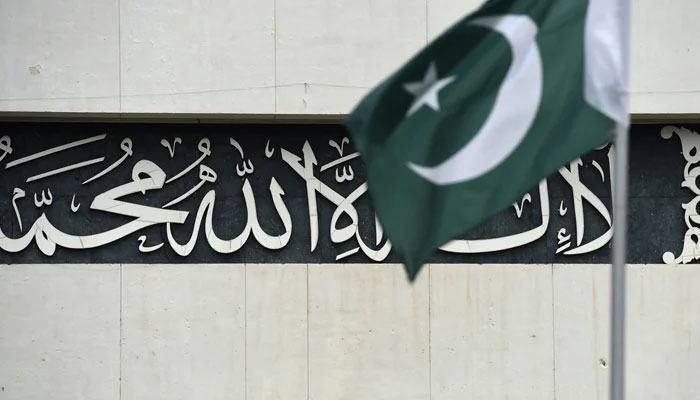After the deluge
New US State Department report on emerging security threats has underscored the threats that climate change poses
Pakistan is stuck in an ‘out of the frying pan into the fire’ situation. In 2022, after the vote of no-confidence, it took some time to get back to stability. But all of this turned upside down when floods hit the country, pushing one-third of it under water. That climate change has become an agent for destabilization is no news, especially for countries that have seen the impacts of the changing climate, which is why most countries have been vocal about rich nations’ disregard for their carbon emissions. A new US State Department report on emerging security threats has underscored the threats that climate change poses. It says that changing climate patterns have all the potential to destabilize a strategically important region like Pakistan.
The 2022 floods provided a glimpse into what the future can hold for us if we fail to take action to combat climate change. Education institutions and healthcare centres in the affected areas were destroyed, depriving people of access to education and healthcare. It is surprising that even though world leaders understand the impact of climate change on developing countries and their strategic partners, they have failed to ensure that the funds pledged during two climate conferences are timely distributed to countries. Some rich nations’ lack of willingness to help countries in distress is also disappointing. Pakistan is the seventh-most vulnerable country to climate change, and yet its carbon emissions are less than one per cent. It is bearing the brunt of the unchecked habits of the developed world, which uses the band-aid labelled ‘development’ to hide practices harmful to the environment.
In the same report, the US talks about Pakistan’s nuclear arsenal and how the country’s plans to set up a nuclear power plant are concerning. In a world that is on the brink of collapse, nuclear disarmament should be our top priority. But the US and other developed countries also have to see how their support for a certain settler-state has forced countries in the Global South to rethink their relationships with the West. The last six months have shown that if a colony is supported by the West, there are no red lines. Given the fact that some developing nations and occupied territories can be left at the mercy of their attackers/oppressors, it makes sense, although we should not hope to see a world where weapons of mass destruction are celebrated, why some countries do not want to join any treaties pledging to disarm themselves. If a rogue state can be allowed to do whatever it pleases, countries will be bound to take measures to set up some impenetrable layers of protection. America’s assessment regarding the threats posed by climate change is correct, but it also has to realize how the use of lethal weapons in wars leads to more climate catastrophes. The path to a healthy climate requires all countries to do all they can to put an end to armed conflicts.
-
 Funeral Home Owner Sentenced To 40 Years For Selling Corpses, Faking Ashes
Funeral Home Owner Sentenced To 40 Years For Selling Corpses, Faking Ashes -
 Why Is Thor Portrayed Differently In Marvel Movies?
Why Is Thor Portrayed Differently In Marvel Movies? -
 Dutch Seismologist Hints At 'surprise’ Quake In Coming Days
Dutch Seismologist Hints At 'surprise’ Quake In Coming Days -
 Australia’s Liberal-National Coalition Reunites After Brief Split Over Hate Laws
Australia’s Liberal-National Coalition Reunites After Brief Split Over Hate Laws -
 DC Director Gives Hopeful Message As Questions Raised Over 'Blue Beetle's Future
DC Director Gives Hopeful Message As Questions Raised Over 'Blue Beetle's Future -
 King Charles New Plans For Andrew In Norfolk Exposed
King Charles New Plans For Andrew In Norfolk Exposed -
 What You Need To Know About Ischemic Stroke
What You Need To Know About Ischemic Stroke -
 Shocking Reason Behind Type 2 Diabetes Revealed By Scientists
Shocking Reason Behind Type 2 Diabetes Revealed By Scientists -
 SpaceX Cleared For NASA Crew-12 Launch After Falcon 9 Review
SpaceX Cleared For NASA Crew-12 Launch After Falcon 9 Review -
 Meghan Markle Gives Old Hollywood Vibes In New Photos At Glitzy Event
Meghan Markle Gives Old Hollywood Vibes In New Photos At Glitzy Event -
 Simple 'finger Test' Unveils Lung Cancer Diagnosis
Simple 'finger Test' Unveils Lung Cancer Diagnosis -
 Groundbreaking Treatment For Sepsis Emerges In New Study
Groundbreaking Treatment For Sepsis Emerges In New Study -
 Roblox Blocked In Egypt Sparks Debate Over Child Safety And Digital Access
Roblox Blocked In Egypt Sparks Debate Over Child Safety And Digital Access -
 Savannah Guthrie Addresses Ransom Demands Made By Her Mother Nancy's Kidnappers
Savannah Guthrie Addresses Ransom Demands Made By Her Mother Nancy's Kidnappers -
 OpenAI Reportedly Working On AI-powered Earbuds As First Hardware Product
OpenAI Reportedly Working On AI-powered Earbuds As First Hardware Product -
 Andrew, Sarah Ferguson Refuse King Charles Request: 'Raising Eyebrows Inside Palace'
Andrew, Sarah Ferguson Refuse King Charles Request: 'Raising Eyebrows Inside Palace'




